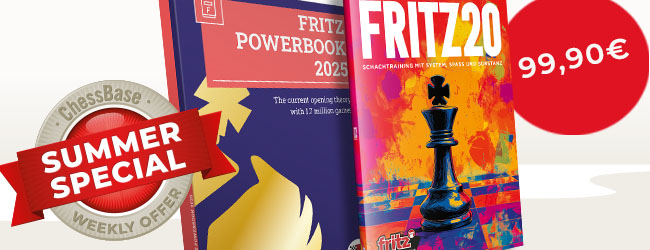Dennis Monokroussos writes:
This week we'll go against concept and look at a very recent game, the battle
between Peter Leko and Teimour Radjabov from the 2006 Morelia/Linares tournament.
Both players were in excellent form in this event, and this game was no exception.
Radjabov essayed one of the most popular lines in contemporary chess, the Sveshnikov
Sicilian, which Leko – himself a long-time devotee of the Sveshnikov
– met with an intriguing near-novelty.
Radjabov did not find (or perhaps did find but rejected) what most commentators,
including Leko himself, have declared the best continuation, but refuting Radjabov's
idea proved quite difficult. When Leko is in good form, however, his play is
a fine blend of strategic depth combined with accurate, deep calculation, and
a 30-minute think produced the solution. From that point on, Leko increased
his advantage bit by bit, exploiting Black's weak light squares and compromised
king's position while simultaneously quashing Black's various attempts at counterplay.
Finally, Leko crowned his efforts with a tactical finish leading to mate –
a beautiful bow wrapping the package.
It's a great game; a bit calmer than the wild Velimirovic Attack we saw the
last two weeks, but still plenty sharp. Strategically, Leko's play is a model
worthy of emulation, and considering the prominence of the Sveshnikov in current
practice, this game deserves a close look by anyone who plays this variation
or faces it. We'll provide a bit of a primer on the line, so even if you're
just curious about it, you'll want to watch this Monday night at 9 pm!
Dennis Monokroussos'
Radio ChessBase
lectures begin on Mondays at 9 p.m. EDT, which translates to 02:00h GMT,
03:00 Paris/Berlin, 13:00h Sydney (on Tuesday). Other time zones can
be found at the bottom of this page. You can use Fritz or any Fritz-compatible
program (Shredder, Junior, Tiger, Hiarcs) to follow the lectures, or
download a free trial client. |
Note: you can watch older lectures by Dennis Monokroussos here:
Enter the above archive room and click on "Games" to see the lectures.
The lectures, which can go for an hour or more, will cost you between one and
two ducats.
That is the equivalent of 10-20 Euro cents (14-28 US cents).
 Dennis
Monokroussos is 39, lives in South Bend, IN, and is an adjunct professor
of philosophy at the University of Notre Dame.
Dennis
Monokroussos is 39, lives in South Bend, IN, and is an adjunct professor
of philosophy at the University of Notre Dame.
He is fairly inactive as a player right now, spending most of his non-philosophy
time being a husband and teaching chess. At one time he was one of the strongest
juniors in the U.S., but quit for about eight years starting in his early 20s.
His highest rating was 2434 USCF, but he has now fallen to the low-mid 2300s
– "too much blitz, too little tournament chess", he says.
Dennis has been working as a chess teacher for seven years now, giving lessons
to adults and kids both in person and on the internet, worked for a number
of years for New York’s Chess In The Schools program, where he was
one of the coaches of the 1997-8 US K-8 championship team from the Bronx, and
was very active in working with many of CITS’s most talented juniors.
When Dennis Monokroussos presents a game, there are usually two main areas
of focus: the opening-to-middlegame transition and the key moments of the middlegame
(or endgame, when applicable). With respect to the latter, he attempts to present
some serious analysis culled from his best sources (both text and database),
which he has checked with his own efforts and then double-checked with his
chess software.
Here are the exact times for different locations in the world. Since Europe
has switched from Summer to Regular time please double-check at World
Time and Date for your time zone.
If your own city or time zone is not listed you can find it at World
Time and Date
























